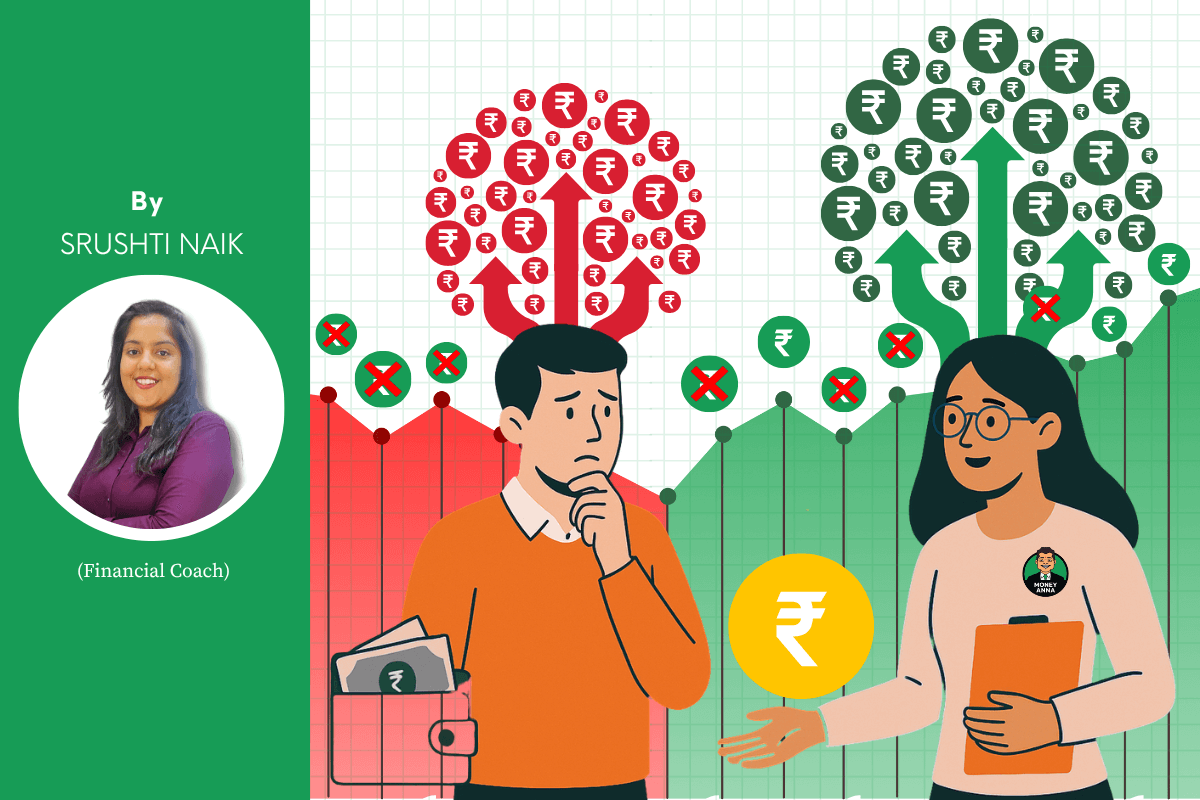What’s in the blog?
Volatility is the nature of the stock market. This blog is to help you understand how to stay calm and think clearly when the stock market gets volatile. We have shared practical ways to stick to your investment plan without second-guessing your decision with every market move because investment requires logic over emotions.
Table of Contents
The stock market doesn’t care about your feelings. But your feelings? They often take control of your investment decisions, don’t they
We’ve all been there—watching the numbers turn red, feeling that pit in our stomach, or getting caught up in the thrill of a skyrocketing stock. It’s easy to let emotions take control, but when they do, they often lead to costly mistakes.
Let’s unpack how emotions influence investing decisions—and, more importantly, how you can stay calm, rational, and in control, no matter what the volatile stock market throws your way.
The Two Biggest Mistakes Investors Make in stock market - Fear and Greed
Every investor wants to make smart decisions, but emotions have a way of clouding judgment. Two of the most dangerous emotions in investing—fear and greed—can push even the most rational people into making costly mistakes. Understanding how they influence your decisions is the first step to keeping them in check.
Fear: The Market’s Favorite Villain
Imagine this: You see the market drop, and suddenly, panic kicks in. “Sell everything! The crash is coming!” Fear makes even smart investors act irrationally, selling solid investments at rock-bottom prices. It’s like canceling a picnic because of one dark cloud—you miss out on the sunshine that follows.
Example: Remember March 2020? COVID-19 sent markets into a freefall, and many people cashed out in fear. But those who held on saw the market bounce back stronger than ever.
Greed: The FOMO Trap
Then there’s the other side of the coin—greed. A hot stock or trend pops up (hello, crypto, meme stocks, or AI stocks), and suddenly, everyone’s buying in. You don’t want to be the only one missing out, right? Before you know it, you’ve invested at peak prices—just in time for the crash.
Example: In 2021, people jumped into crypto hoping to get rich overnight. But when the hype faded, many were left with coins worth less than their morning coffee.
Why Do We Let Emotions Take Over Our Investment Decisions?
Whether it’s the fear of losing money or the thrill of chasing the next big thing, our instincts often work against us in the market. Even the most seasoned investors aren’t immune to emotional decision-making. Understanding the psychological traps that lead to poor investment choices can help you break free from them. Here are the reasons that let our emotions take over –
1. Loss Aversion
We fear losing money more than we enjoy making it. That’s why we hold on to bad investments, hoping they magically recover while selling good ones too soon.
2. FOMO (Fear of Missing Out)
When everyone around you is investing in “the next big thing,” it’s easy to feel left out. But many times, that “big thing” turns out to be a short-lived bubble.
3. Overconfidence
A few lucky trades, and suddenly, you feel like the next Warren Buffett. But the market has a way of humbling even the boldest investors.
How to Ensure We Invest with Logic not Emotions
1. Have a Plan and Stick to It
Think of your investment strategy like a road trip with GPS. There will be bumps, but if you follow the plan, you’ll reach your destination.
2. Diversify Like a Buffet
Don’t put all your money into one thing. Spread your investments so that if one falls, others can balance it out.
3. Tune Out the Noise
News headlines love drama. But just because the media shouts “Market Crash!” doesn’t mean you need to act on it. Focus on long-term goals, not short-term panic.
4. Be a Contrarian Thinker
When everyone is selling, it might be a good time to buy. When everyone is buying, take a step back and think. As the saying goes, “The trend is your friend—until it isn’t.”
5. Talk to a Financial Coach
Sometimes, you need someone to give you a reality check. A good advisor helps you make rational decisions when emotions run high.
“If Your Emotions Are in Control You Can Turn Market Volatility into Opportunity”
My Take
Market ups and downs aren’t bad—they’re just part of the game. When prices drop, think of it as a discount sale. And when they rise, it’s a chance to reassess your strategy.
Investing is like a roller coaster—scary at times, thrilling at others, but rewarding if you stay on the ride. The key is to stay patient, avoid herd mentality, and not let emotions make decisions for you.
So next time the market goes wild, take a deep breath. Don’t panic, don’t celebrate too soon, and definitely don’t let emotions rule your portfolio.
Happy Investing!
P.S. What’s your most memorable emotional investing story? Share in the comments.




